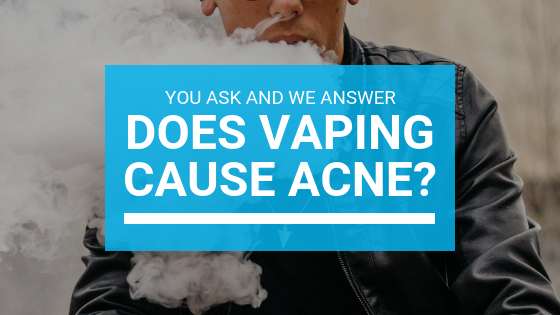There is a long history of doubt concerning the links between smoking and the sudden appearance of acne. While some will tell you that smoking definitely causes acne, others, by their personal experience and otherwise, prove that wrong. We all know smokers and nonsmokers, and it's fairly easy to notice that a good chunk of smokers don't have acne, while many nonsmokers have to deal with pimples.

Smoking, of course, is a serious problem - it's more serious than acne. (And, not to mention, there are a lot of skincare solutions we can use to treat acne fast.)
As science and technology progress, people develop new inventions to solve old problems.
So can vaping cause skin issues? If you've started vaping, or are a regular vaper, read on!
The Phenomenon of Vaping: The Safer Alternative
The invention of the e-cig (the electronic cigarette) gave rise to a phenomenon we all know as vaping. The noble idea behind this was to encourage people to quit smoking cigarettes or offer them a familiar but safer alternative. Vapers still 'smoke,' but the difference is that their e-cigarettes and vape pens contain fewer harmful components, leading to less various health risks. (Or so the major e-cig companies claim.)

And as more and more people transition to a hopefully safer replacement for regular cigarettes, they wonder how this transition affects their skin. Thousands of reports and testimonials about vaping and skin conditions have flooded the internet, but what's the truth?
What Vapers With Acne Report
People report wildly different accounts of their experience with vaping.
Some claim that as they transitioned over to vaping, they observed a gradual decrease in pimples. Acne breakouts, once frequent, were now few and far between, and their skin began to heal more easily. Even acne scars and discoloration seemed to be reduced and even completely absent.
These reports go so far as to claim that vaping helped them get rid of acne. But the only change these people made was to ditch smoking and start vaping.
Yeah, we wouldn't blame you if you had trouble believing that, too.

Vaping Can Cause Acne Flare-Ups Around The Mouth
It's possible that vaping can cause dry skin and lead to acne breakouts. This is because Propylene glycol is one of the main ingredients of e-liquids, and it's used to absorb water. When our skin becomes too dry, our body produces excess sebum. Sebum is an oily and waxy substance that can clog pores, trap dirt and dead skin, and lead to spots.
Other accounts go completely against the acne-healing power of vaping. Some vapers have reported more acne flare-ups after they picked up vaping. Some have even reported getting acne for the first time. Acne breakouts around the area of the mouth, such as chin acne and perioral dermatitis, are a frequent staple of these reports. This has made other people suspect that the production of more oil and these unexpected acne outbursts have something to do with the vape touching their mouths.
This appears true, as vapers who experienced this bout of acne admit to touching their faces more frequently due to the moist effect of the water vapor. Eventually, most vapers who tried refraining from touching their faces saw the acne disappear.
So, again, these cases of acne inflammation don't appear to be caused by vaping itself.

Quit Zits
Others experienced the so-called "quit zits" - pimples that appear soon after a person changes their habits.
You know - you hit the gym after a year of being a potato, and boom, zits. Or you quit smoking, and you get spots. Or, you start smoking again, and boom, acne. However, this temporary phenomenon merely reflects the sudden changes in your metabolism. Their cause is the hormonal workings of your body, not the gym, traditional cigarettes, e-cigs, vape pens, or whatnot. Soon after "quit zits" occur, the body returns to normal, and they disappear.
Granted, if you pick up vaping, you may see at least one of these symptoms. But none of these accounts should be believed because none seem to have detected the root cause. Sure, vaping may be causing them, but what else is there?

A lot, really.
What makes things even more complicated is the vast sea of people reporting that vaping didn't change their acne. It didn't even improve their skin. However, it did make them happier because they managed to give up smoking, which, in turn, helped them deal with their acne and the associated anxiety and depression better. Also, quitting smoking will improve high blood pressure, put less stress on the blood vessels, and reduce the risk of skin cancer.
Combine that with some intentional skincare, and chances are you'll have good health and clear skin to boot.
To sum it up, while the physical effects of vaping on acne are unclear, the psychological effects are certainly beneficial.
But what does science say?

What’s Inside Electronic Cigarettes
E-cig companies love to boast that their product is 99% water vapor and 100% harmless. Vape ads will seriously make you reconsider your smoking habit. Or, it may even appeal to non-smokers - that's the power of marketing.
The ads are largely true. These alternative cigarettes produce a lot of water vapor, emitted by the so-called e-liquid that makes up the bulk of the vape pen. This e-liquid contains nicotine, and as it heats up, it produces a vapor that is inhaled and exhaled by those using the device.
The advantage of these devices over your ordinary "cancer stick" is that e-cigs and vape pens aren't made of tobacco, so they don't contain tar. At all. This is a huge benefit since it's exactly the buildup of tar in the lungs of smokers that eventually leads to lung cancer and lung disease.
Even though the ads boast that vaping is safe, keep in mind that the vaping age in the US is 21. In the UK, the vaping age is 18.
What Science Says About Vaping
But besides nicotine, e-cigarettes also contain several other ingredients. These include water, propylene glycol, vegetable glycerin, nicotine, and, depending on the flavoring, potentially harmful chemicals.

The water, mixed with the propylene glycol and vegetable glycerin compounds, holds the nicotine, which is then delivered to the body through inhalation. These ingredients have been used by the cosmetic industry for decades, so they appear to be fairly safe. But as it's a new thing, we still don't know the health risks of vaping.
Here’s what the experts say:
- “Vaping can help smokers quit smoking, and vaporizers are less harmful than tobacco cigarettes” (John Hopkins School of Medicine);
- “E-cigarettes are around 95% less harmful than smoking” (Public Health England);
- “E-cigarettes appear to be effective when used by smokers as an aid to quitting smoking… However, the hazard to health arising from long-term vapor inhalation from the e-cigarettes available today is unlikely to exceed 5% of the harm from smoking tobacco” (Royal College of Physicians).
So, while vaping is safer than smoking, it's still not harmless. At the very least, it does administer nicotine, causing nicotine addiction. But what about vaping and acne?
Has Science Found a Link Between Vaping and Acne?
Scientists have yet to find a definitive answer to this question. And, with vaping being a fairly recent phenomenon, scientific studies and more research are still underway. It will take a while until the results are in, so meanwhile, we are stuck with contradictory reports.

Some vapers report that their acne healed after they picked up vaping, while others blame vaping for their breakouts. However, science has proved that, without a doubt, smoking tobacco (cigarettes) does have deleterious effects on our skin. It gives you naturally dry skin, causes wrinkles, and often makes acne and its scars even worse. There are a whole host of skin-related problems that might improve if you stop smoking.
But vaping isn't smoking.
When it comes to vaping, it pays off to take a closer look at the ingredients in your e-cigarette or vape pen. Most e-cigs contain flavorings, commonly made up of diacetyl, an artificial flavoring. Thankfully, some scientists got curious and decided to take a good hard look at it.
One study found that diacetyl "caused many respiratory problems by increasing oxidative stress" (Frontiers In Physiology). While this may seem not even remotely connected to acne, oxidative stress is exactly the process that causes the body to lose its antioxidants. Losing antioxidants, in turn, causes cell dysfunction and contributes to the skin's ability to stay healthy. This leads to the clogging of skin pores, creating whiteheads and blackheads, which are the first link in the chain that causes acne.
What's more, the good people at Harvard inspected a total of 51 different flavors of e-cigarettes and found that 47 contained artificial flavorings. Of those, 39 contained this problematic diacetyl compound. An interesting detail is that all of the products which contained flavors boosted by diacetyl were targeted at young people.

So, while diacetyl in e-cigarettes doesn't directly cause acne, it can surely contribute to it.
But e-cigarettes being, you know, electronic, they also contain so-called heavy metals, such as tin, nickel, and silver. Most of these metals are present due to the casing, the electronics, and the wiring, but a small portion of these heavy metal molecules still end up in the body.
What does that have to do with your skin, though? Well, heavy metals deplete antioxidants, which, as we said, can contribute to the body's failure to maintain the skin, clogging up the pores and causing acne. Quitting vaping might be starting to look like a good idea.
So, Does Vaping Cause Acne?
Vaping is a much better alternative than smoking tobacco and filling your lungs and body with tar and other chemicals. After all, our food industries today use a wealth of pesticides and chemicals to make plants more productive, and those plants include tobacco too. So, while it is recommended for smokers to ditch cigarettes and pick up a vape pen, vaping is still not without consequences.
As we saw, many people report contradictory effects of vaping on their skin. Some claim that vaping has cured them forever, while others complain that vaping is the cause of their acne. At the very least, vaping causes nicotine addiction and prolongs the vice that smokers have. When it comes to acne, vaping contains harmful chemicals that may make skin health worse.

While science is still out on whether vaping can cause acne, there are several factors to consider when picking up vaping. Diacetyl, the artificial flavoring in e-cigarettes, can lead to respiratory problems and deplete the antioxidants in the body, inhabiting the body's ability to heal itself. The heavy metals found in electronic cigarettes (or vape pens), like silver, tin, and nickel, can also enter our systems and cause further depletion of our antioxidants.
Without the precious antioxidants, our skin can't regenerate and clean itself, leading to clogged pores and an open field for bacteria, causing breakouts. As a result, you might get skin rashes and other skin problems.
Of course, you can compensate for this by increasing your intake of antioxidants, either by foods or supplements, but why make simple things more complicated, eh? (Still, we'd recommend anyone suffering from this skin problem to eat a healthy diet.)
But still, congratulations on quitting smoking. At the very least, you will see improved skin health and the reduction of wrinkles after picking up electronic cigarettes. But you know what will improve your health even further? Quitting vaping as well.
Prevent Acne Breakouts With the No 1 Solution
The jury might be out on whether or not vaping causes acne outbreaks, but that doesn't mean you can't vape and treat acne simultaneously. If you don't want to quit vaping, try Misumi's Complete Clear 3-Step System. This treatment will unclog pores and remove dead skin cells, reduce inflammation, calm breakouts, and even protect with SPF 30, slowing down premature aging. Get the healthy skin you deserve.
References
Nicotine without smoke: Tobacco harm reduction
Public Health England maintains vaping is 95% less harmful than smoking
Public Health Statement for Propylene Glycol
Chemicals linked with severe respiratory disease found in common e-cigarette flavors
This information is meant to supplement, not replace advice from your doctor or healthcare provider and is not meant to cover all possible uses, precautions, interactions or adverse effects. This information may not fit your specific health circumstances, and its goal is to offer a general view of the subject. In case you are suffering from a severe case of acne, you should consult with a dermatologist or a certified medical professional.








